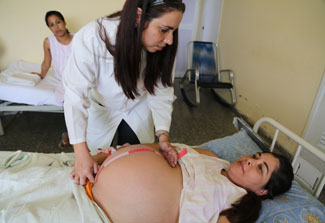US scientists explore research partnerships with Cuba
November / December 2015 | Volume 14, Issue 6

Photo courtesy of PAHO
Cuba is the first country that has eliminated mother-to-child
transmission of HIV and syphilis, among the topics U.S.
scientists might explore with their Cuban counterparts, as
relations between the two countries improve.
By Ann Puderbaugh
PHILADELPHIA - The recent thaw in U.S.-Cuban relations may provide opportunities to expand scientific partnerships between the countries, a topic explored in a panel discussion at the recent American Society of Tropical Medicine and Hygiene (ASTMH) annual meeting.
"Cooperation in health and science focuses our efforts on a goal that's easy to understand and share - the goal of a healthier world," noted Ambassador Jimmy Kolker, who is Assistant Secretary for Global Affairs at HHS. "Our close proximity means that we share waters and are impacted by the same environmental factors and the same tropical storms. As travel increases, communicable diseases will move even more between our countries and collaboration will be increasingly important."
With a life expectancy on a par with the U.S., Cuba has useful lessons to offer, Kolker observed. "It is exceptionally important that Cuba became the first country ever in the whole world to eliminate mother-to-child transmission of HIV and syphilis."
Cuba is also renowned globally for its expertise in disaster response. It mobilized the Cuban Medical Brigade to combat the Ebola outbreak where, in some instances, Cubans worked side-by-side with Americans. "We witnessed science in action most recently in West Africa," said Fogarty Director Dr. Roger I. Glass, who moderated the discussion. "Imagine if you could, dream if you will, Cuban physicians working in an American hospital to address a global threat."
Leading Cuba's Ebola response was Dr. Jorge Delgado, who said 12,000 Cuban health care workers volunteered for the mission because "human beings are human beings." About 250 were selected and traveled to West Africa after training. One died of cerebral malaria while on duty there.
In the last 55 years, the Brigade has worked in 160 countries, treated countless patients and saved an estimated 5 million lives, Delgado noted. The Brigade has responded to numerous hurricanes, earthquakes, floods and other disasters around the globe.
The life expectancy of Cubans is similar to the U.S., so Cuban health officials are facing the same health problems as the U.S. - an aging population, reported Dr. Lupe Guzman, the head of virology at the Pedro Kouri Institute of Tropical Medicine in Havana. Of the country's 11 million inhabitants, nearly 20 percent are older than 60, and that's expected to rise to about one-third of the population in the next 50 years. Cancer is already among the top three causes of death in her country, Guzman said.
With chronic, noncommunicable diseases a shared interest, there are numerous promising areas for research collaboration, Kolker proposed. Neurodegenerative diseases such as Alzheimer's pose huge health and resource issues for both countries. Cuba's planned national dementia registry and the U.S. Brain Initiative may find common ground, he said.
Infectious diseases - such as chikungunya, dengue and flu - remain challenging for the U.S. and Cuba. With tourism to the island nation bringing more than 3 million visitors each year, and expected to rise, diseases are spreading faster. Scientists could make quicker progress by working together, Guzman noted, "We have some relationships and ongoing collaborations, the point is to increase and strengthen this."
Nurturing these partnerships is the Pan American Health Organization (PAHO), WHO's regional office for the Americas. "It's a great opportunity to advance collaborations, increase people-to-people contacts and make significant contributions to global health," said Dr. Marcos Espinal, PAHO's director of communicable diseases. "PAHO is very pleased to be a broker between these two member states."
Indeed, PAHO - together with ASTMH - sponsored the Cuban scientists' travel to the U.S. to speak at the conference, the first Cubans ever to participate in the annual Trop Med meeting. It was a momentous occasion, said Guzman. "Many times, we have met in Cuba or some other place, but to meet here is very special."
Despite the improved relations between the two countries, Kolker injected a note of caution that progress may be slower than desired. "Diplomatic relations are not a light switch that can be turned on," he noted. "Trust needs to be built; it cannot be taken for granted. And I look forward to facilitating that trust and understanding."
More Information
To view Adobe PDF files,
download current, free accessible plug-ins from Adobe's website.